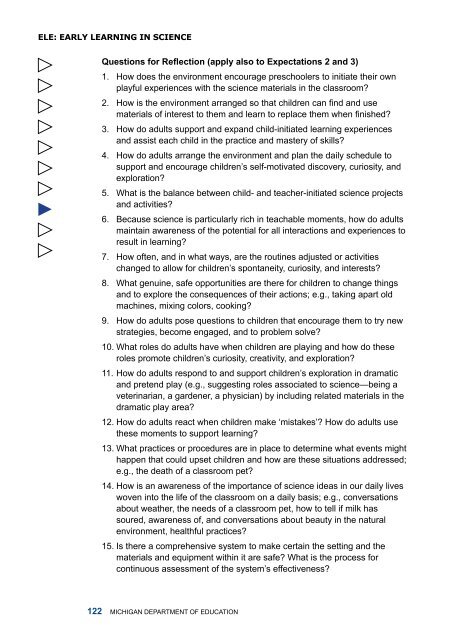Early Childhood Standards of Quality for ... - State of Michigan
Early Childhood Standards of Quality for ... - State of Michigan
Early Childhood Standards of Quality for ... - State of Michigan
Create successful ePaper yourself
Turn your PDF publications into a flip-book with our unique Google optimized e-Paper software.
ELE: EARLY Learning IN SCIENCEQuestions <strong>for</strong> Reflection (apply also to Expectations 2 and 3)1. How does the environment encourage preschoolers to initiate their ownplayful experiences with the science materials in the classroom?2. How is the environment arranged so that children can find and usematerials <strong>of</strong> interest to them and learn to replace them when finished?3. How do adults support and expand child-initiated learning experiencesand assist each child in the practice and mastery <strong>of</strong> skills?4. How do adults arrange the environment and plan the daily schedule tosupport and encourage children’s self-motivated discovery, curiosity, andexploration?5. What is the balance between child- and teacher-initiated science projectsand activities?6. Because science is particularly rich in teachable moments, how do adultsmaintain awareness <strong>of</strong> the potential <strong>for</strong> all interactions and experiences toresult in learning?7. How <strong>of</strong>ten, and in what ways, are the routines adjusted or activitieschanged to allow <strong>for</strong> children’s spontaneity, curiosity, and interests?8. What genuine, safe opportunities are there <strong>for</strong> children to change thingsand to explore the consequences <strong>of</strong> their actions; e.g., taking apart oldmachines, mixing colors, cooking?9. How do adults pose questions to children that encourage them to try newstrategies, become engaged, and to problem solve?10. What roles do adults have when children are playing and how do theseroles promote children’s curiosity, creativity, and exploration?11. How do adults respond to and support children’s exploration in dramaticand pretend play (e.g., suggesting roles associated to science—being aveterinarian, a gardener, a physician) by including related materials in thedramatic play area?12. How do adults react when children make ‘mistakes’? How do adults usethese moments to support learning?13. What practices or procedures are in place to determine what events mighthappen that could upset children and how are these situations addressed;e.g., the death <strong>of</strong> a classroom pet?14. How is an awareness <strong>of</strong> the importance <strong>of</strong> science ideas in our daily liveswoven into the life <strong>of</strong> the classroom on a daily basis; e.g., conversationsabout weather, the needs <strong>of</strong> a classroom pet, how to tell if milk hassoured, awareness <strong>of</strong>, and conversations about beauty in the naturalenvironment, healthful practices?15. Is there a comprehensive system to make certain the setting and thematerials and equipment within it are safe? What is the process <strong>for</strong>continuous assessment <strong>of</strong> the system’s effectiveness?122 <strong>Michigan</strong> Department <strong>of</strong> Education


